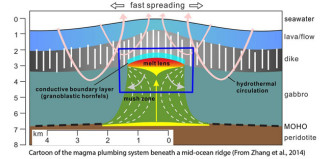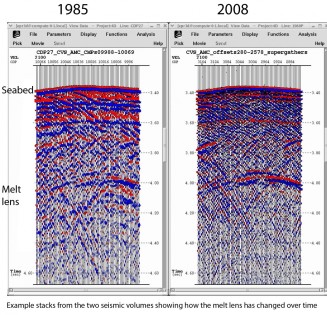Full-waveform inversion of time-lapse seismic from the East Pacific Rise

Mid-ocean ridges represent the longest and most significant chain of volcanoes on our planet, yet due to their remoteness remain relatively poorly studied. Establishing the details of the magmatic plumbing system beneath these features is needed in order to understand how melt is delivered from the mantle to form new oceanic crust (Fig.1). Whilst seabed features such as eruptive fissures and lava flows delineate the portion of the ridge involved in a given eruption, we do not know how the magmatic system behaves at depth: which part of the magma reservoir is drained during an eruption, what changes take place shortly before and after the eruption (such as pre-eruption inflation, post-eruption deflation, changes in liquid fraction), and what the evolution leading to the next co-located event is like. We do not even know how, and on what time scales, magma chamber replenishment takes place, nor what triggers eruptions.

Fifteen years ago, Collier and Singh applied full waveform inversion for the first time to seismic reflection data collected at the East Pacific Rise. During this work a converted shear-wave was discovered which was used to directly determine the molten state within the melt lens that sits beneath the axis of the ridge. In 2005/6, part of the studied volcanic system erupted, and in 2008 was re-surveyed giving a unique opportunity to understand how the melt system had changed over time (Fig.2). The new dataset was the first ever multi-source, multi-streamer seismic survey of a mid-ocean ridge giving unprecedented images of the melt system.
The aim of this project is to apply waveform inversion on the pre- and post-eruption seismic datasets in order to quantify the change in physical properties within the axial melt lens over time. This will allow a direct comparison of magma chamber properties and so gain insight into the dynamics associated with the eruption.
Collaborators
- Satish Singh (IPG, Paris)
- Helene Carton (IPG, Paris)